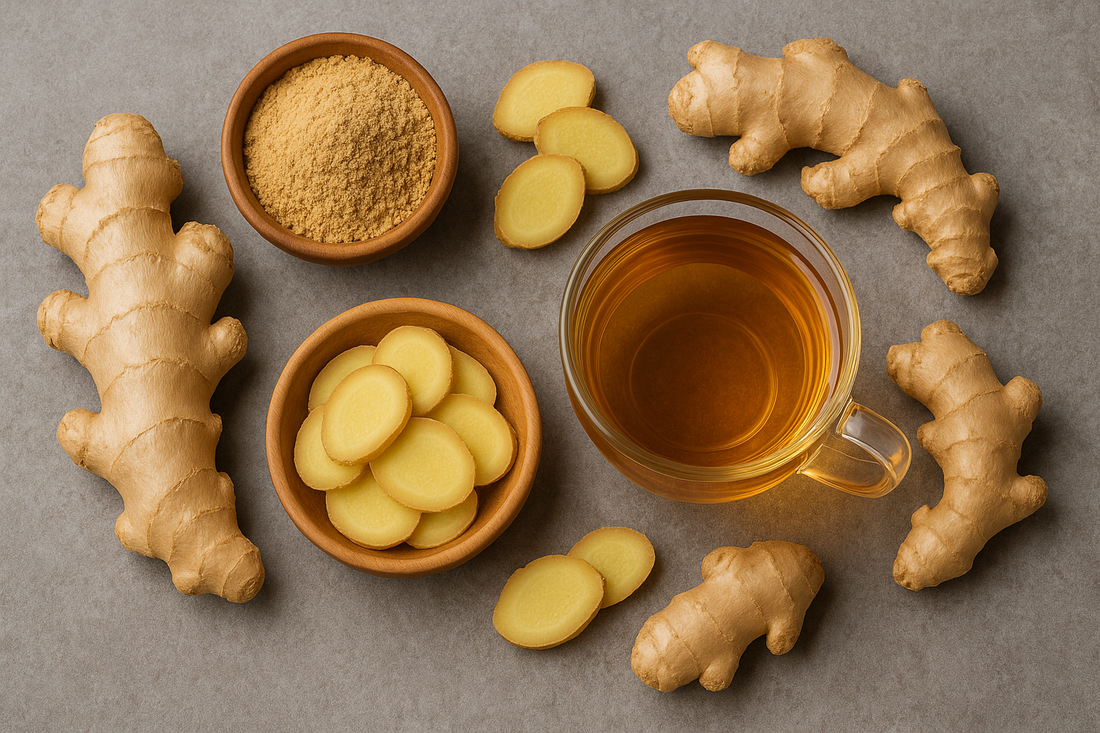
Top 6 Proven Health Benefits of Ginger, Backed by Science
Share
For centuries, ginger (Zingiber officinale) has been a cornerstone of traditional medicine, celebrated for its warming flavor and powerful health-supporting properties. Ancient cultures in Asia, the Middle East, and beyond turned to ginger to ease digestion, fight colds, and soothe pain. Today, modern science is catching up, and an expanding body of research is confirming what traditional healers have long believed: ginger is far more than a kitchen spice. From reducing inflammation to improving heart health, ginger offers a wide range of scientifically supported benefits.
 1. Anti-Inflammatory and Antioxidant Power
1. Anti-Inflammatory and Antioxidant Power
One of ginger’s most studied features is its anti-inflammatory and antioxidant capacity. The active compounds, particularly gingerols and shogaols, help reduce oxidative stress by neutralizing free radicals and modulating inflammatory pathways like NF-κB. In doing so, ginger supports the body’s defenses against chronic conditions that stem from ongoing inflammation. A 2024 review highlighted ginger as a natural immunomodulator capable of preventing both oxidative damage and inflammation (Frontiers in Nutrition, 2024). This provides a strong scientific basis for why ginger is so often recommended for general wellness.
 2. Relief from Nausea
2. Relief from Nausea
Perhaps one of ginger’s most widely recognized benefits is its ability to reduce nausea and vomiting. Clinical studies and meta-analyses show that ginger is effective against nausea related to pregnancy, post-surgical recovery, chemotherapy, and even motion sickness. A systematic review found consistent evidence that ginger supplementation alleviates nausea across multiple conditions (NCBI, 2020). Unlike some pharmaceutical anti-nausea drugs, ginger achieves these effects without serious side effects, making it a gentle yet reliable option.
 3. Pain and Digestive Health
3. Pain and Digestive Health
Ginger’s anti-inflammatory properties extend into the realm of pain relief. Several randomized trials have shown that ginger reduces menstrual pain (dysmenorrhea) as effectively as some over-the-counter medications. It has also been studied for arthritis, migraines, and exercise-induced muscle soreness, where results indicate meaningful pain reduction (Medical News Today).
In addition, ginger supports healthy digestion. By accelerating stomach emptying and reducing bloating and gas, it can bring comfort to those with indigestion. Emerging evidence even suggests ginger may help individuals with irritable bowel syndrome (IBS). A 2025 study showed ginger supplementation reduced IBS symptoms such as bloating and frequent stools compared to placebo (ScienceDirect, 2025).
 4. Blood Sugar and Heart Health
4. Blood Sugar and Heart Health
Another area of research that has generated excitement is ginger’s role in metabolic health. Studies indicate that ginger can improve insulin sensitivity, lower fasting blood sugar, and reduce HbA1c levels in people with type 2 diabetes (ScienceDirect, 2022).
Beyond blood sugar, ginger also improves lipid profiles by lowering total cholesterol and LDL while supporting higher HDL. These effects, combined with its blood pressure-lowering potential, make ginger a valuable ally for cardiovascular health. A 2025 review confirmed that regular consumption—around 500 mg per day—was linked to reduced inflammation and improved vascular function, potentially lowering the risk of cardiovascular disease (Food & Wine, 2025).
 5. Anti-Aging and Longevity Potential
5. Anti-Aging and Longevity Potential
Although human studies are still emerging, new research points to ginger’s potential role in healthy aging. A 2024 review in Biomolecules reported that ginger impacts multiple hallmarks of cellular aging, including oxidative stress and inflammation (NCBI, 2024). While much of this work is based on animal models, it adds to the growing picture of ginger as a spice with benefits that extend far beyond short-term relief.
 6. Safety and Practical Use
6. Safety and Practical Use
Ginger is considered safe for most people when consumed in moderate amounts—typically up to 4 grams per day. High doses may cause mild side effects such as heartburn or stomach upset. Importantly, those taking blood thinners or certain medications should consult their healthcare provider before using ginger supplements, as interactions are possible.
The simplest way to incorporate ginger into daily life is through ginger tea, fresh grated ginger in meals, or ginger powder in smoothies. Consistency, rather than large doses, appears to be key to reaping its benefits.
 Conclusion
Conclusion
From ancient remedies to modern clinical trials, ginger has earned its reputation as a powerful plant ally. Its ability to calm nausea, reduce pain, support digestion, improve blood sugar control, and protect the heart makes it one of the most versatile natural health boosters available. Backed by a growing body of scientific research, ginger can be embraced not only as a flavorful spice but also as a daily addition to a healthy lifestyle. Whether enjoyed as tea, fresh root, or supplement, ginger stands as a bridge between tradition and modern science—bringing time-honored wisdom into today’s evidence-based world.
